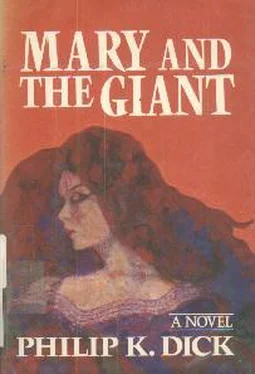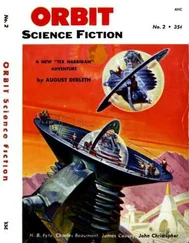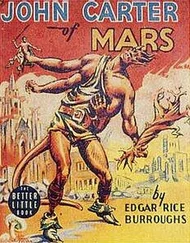Philip Dick - Mary And The Giant
Здесь есть возможность читать онлайн «Philip Dick - Mary And The Giant» весь текст электронной книги совершенно бесплатно (целиком полную версию без сокращений). В некоторых случаях можно слушать аудио, скачать через торрент в формате fb2 и присутствует краткое содержание. Жанр: Фантастика и фэнтези, на английском языке. Описание произведения, (предисловие) а так же отзывы посетителей доступны на портале библиотеки ЛибКат.
- Название:Mary And The Giant
- Автор:
- Жанр:
- Год:неизвестен
- ISBN:нет данных
- Рейтинг книги:4 / 5. Голосов: 1
-
Избранное:Добавить в избранное
- Отзывы:
-
Ваша оценка:
- 80
- 1
- 2
- 3
- 4
- 5
Mary And The Giant: краткое содержание, описание и аннотация
Предлагаем к чтению аннотацию, описание, краткое содержание или предисловие (зависит от того, что написал сам автор книги «Mary And The Giant»). Если вы не нашли необходимую информацию о книге — напишите в комментариях, мы постараемся отыскать её.
Mary And The Giant — читать онлайн бесплатно полную книгу (весь текст) целиком
Ниже представлен текст книги, разбитый по страницам. Система сохранения места последней прочитанной страницы, позволяет с удобством читать онлайн бесплатно книгу «Mary And The Giant», без необходимости каждый раз заново искать на чём Вы остановились. Поставьте закладку, и сможете в любой момент перейти на страницу, на которой закончили чтение.
Интервал:
Закладка:
Frowning with annoyance, he bent down and gathered her up. With his bare foot-he had on only his pants--he kicked the door shut behind them. Carrying her, he padded down the hall, his blue-black face fragrant with shaving soap, his chin and furry chest dripping beads of lather. Around the girl's body his hands were brusque; she closed her eyes and clung to him.
"Help me," she repeated. "I quit my job; I don't have a job anymore. I met an awful old man and he did something to me. Now I don't have any place to stay."
7
At the corner of Pine and Santa Clara Streets was a swank hat shop. After the hat shop came Dwelley's Luggageware, and after that the Music Corner, the new phonograph record shop opened by Joseph Schilling in the early weeks of August 1953.
It was toward the Music Corner that the man and woman , moved. The shop had been open two months: it was now the middle of October. In the display window was a photograph of Walter Gieseking and two long-playing records half-slid from their bright covers. Customers were visible inside the shop, some at the front counter, others in the listening booths. The Saint-Satins Organ Symphony echoed through the open doorway.
"Not bad," the man admitted. "But he's got the loot; it should look okay."
In his thirties, he was dapper and fragile-looking, with shiny black hair, a bird-chested man who walked daintily. His eyes were quick and alive, and his hands, as he guided the woman into the store, fluttered against her coat.
The woman turned to see the sign over the doorway. It was a square of hardwood, with hand-carved fretwork, on which had been painted the words THE MUSIC CORNER, 517 PINE STREET. MA3-6041. OPEN 9-5. RECORDS AND CUSTOM-BUILT SOUND EQUIPMENT.
"It's cute," she said. "The sign, I mean."
She was younger than the man, a heavy, round-faced blonde who wore slacks and carried an immense leather bag which hung from her shoulder by a strap.
There was nobody behind the counter. Two young men were studying a record catalogue; they were involved in controversy. The woman did not see Joseph Schilling, but every aspect of the store's interior reminded her of him. The pattern of the wall-to-wall carpeting was characteristic of his taste, and many of the pictures on the walls-prints by contemporary artists-were familiar. The little vase on the counter-it held California wild iris-had been designed and fired by her. And the catalogues behind the counter were bound in a fabric of her choosing.
The woman seated herself and began reading a copy of High-Fidelity, which she found lying on a table. The man, less relaxed, inspected display racks and turned revolving wheels of records. He was poking at a Pickering cartridge when a familiar shuffling sound caught his attention. Up the flight of steps from the basement stockroom, his arms filled with records, came Joseph Schilling.
Tossing down the magazine, the woman rose to her feet. Plump and smiling, she advanced toward Schilling. The man joined her.
"Hi," the man muttered.
Joseph Schilling came to a stop. He was not wearing his glasses and, for a moment, he had trouble making them out. He imagined they were customers; their clothing informed him that they were fairly well off, fairly educated, extremely arty people. Then he recognized them.
"Yes," he said, in an unsteady, hostile voice. "The line forms ... amazing, how fast."
"So this is it," the woman said, glancing around. Her smile, fixed and intense, remained; a frozen smile, made up of heavy lips and teeth. "It's lovely! I'm so glad you finally got it."
Stiffly, Schilling set down his records. He wondered where Max was; they were afraid of Max. Probably down at the corner cocktail lounge, sitting in a booth constructing a tower of matches. "It's not a bad location," he said.
Her blue eyes danced. "This is what you always wanted, all these years. Remember," she said to her companion, "how he always talked about his store? The record store he was going to open up someday, when he got the money."
"I decided not to wait," Schilling said.
"Wait?"
"For the money." It didn't sound convincing; he was bad at games. "I'm broke. Most of this stuff is on consignment. My capital went into the remodeling."
"You'll struggle along," the woman said.
From his coat pocket Schilling got a cigar. As he lit up, he said: "Seems to me you've gained weight."
"I suppose so." The woman searched her mind. "How long has it been?"
"It was 1948," her companion said.
"We've all gotten older," the woman said.
Schilling went to wait on a middle-aged customer. Presently he returned. They were still there; they hadn't left. He hadn't really expected them to. "Well, Beth," he said, "what brings you here?"
"Curiosity. We haven't seen you in so long ... when we read in the paper about your store, we said, 'Let's hop in the car and drive up there.' So we did."
"What paper?"
"The San Francisco Chronicle."
"You don't live in San Francisco."
"Somebody sent us the clipping," she said vaguely. "They knew we'd be interested."
It had certainly been his mistake, five years ago, to mix with these people. He would never shake them, not now. They had found him and his store: he was a duck in a rain barrel. And he had tangible assets.
"Did you come out from Washington?" he asked. "Getting away from the winter?"
"God," Beth said, "we haven't lived in Washington in years. We lived in Detroit and then we moved to Los Angeles."
Following me, Schilling thought. Coming west with their noses to the ground.
"We stopped by to see you," Beth said, "when you were living in Salt Lake City. But you were having some sort of business meeting, and we couldn't stay."
"That was a nice spot you had there," Coombs, the man, said. "Did you own that place?"
"I had an interest."
"That wasn't a store, was it? Not that big brick building? It looked like a warehouse."
"Wholesalers," Schilling said. "We jobbed for a number of labels."
"And you built up capital for this shop?" Coombs was skeptical. "You were better off there; you won't do any business in a town this size."
"I guess you haven't seen the duck," Schilling said. "The duck in the park. He doesn't buy much, but he's fun to watch. What are you two doing these days? For a living, I mean."
"Different things," Beth said. "I taught for a while; that was in Detroit."
"Piano?" he asked.
"Oh, certainly. I stopped playing the cello years ago. I had stopped when-I met you."
"That's so," Schilling said. "There was one around your apartment, but you didn't play it."
"Two busted strings. And I lost the bow."
"It seems to me I had an old joke about lady cello players," Schilling said. "It had to do with their psychological motives."
"Yes," Beth agreed. "It was really a terrible joke, but I always thought it was funny."
Schilling felt himself mellow, remembering. "Freudian analysis ... a popular indoor pastime, in those days. Not so popular now. What was it I said?"
"Women cello players. They have a subconscious need for something large between their legs." Beth laughed. "You were delightful. You really were."
It was hard to believe he had ever wanted this hefty girl, had carted her off for a weekend, found his way into that wonderfully avid cunt, and then returned her to her husband more or less in tact. But she had not been hefty then; she had been small. Beth Coombs was still attractive-her skin was quite smooth and her eyes, as always, were clear. The affair had been brief and intense, and he had enjoyed it. If only there had been no aftereffects.
"What now?" he said, including the both of them. "Going to hang around town?"
Beth nodded, but Coombs pretended he hadn't heard.
"Oh, come on, Coombs," Schilling said. "Let's face it. You're that by which vinegar got from the bucket to Our Savior's mouth."
Читать дальшеИнтервал:
Закладка:
Похожие книги на «Mary And The Giant»
Представляем Вашему вниманию похожие книги на «Mary And The Giant» списком для выбора. Мы отобрали схожую по названию и смыслу литературу в надежде предоставить читателям больше вариантов отыскать новые, интересные, ещё непрочитанные произведения.
Обсуждение, отзывы о книге «Mary And The Giant» и просто собственные мнения читателей. Оставьте ваши комментарии, напишите, что Вы думаете о произведении, его смысле или главных героях. Укажите что конкретно понравилось, а что нет, и почему Вы так считаете.










